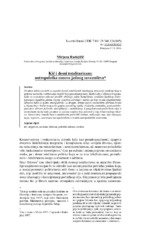Kič i ‘desni‘ totalitarizam – antropološke osnove jednog savezništva
Kitsch and Right Totalitarianism: The Anthropological Foundations of Particular Alliance
| dc.contributor | Čović, Ante | |
| dc.creator | Radojičić, Mirjana | |
| dc.date.accessioned | 2018-06-18T11:36:24Z | |
| dc.date.available | 2018-06-18T11:36:24Z | |
| dc.date.issued | 2016 | |
| dc.identifier.issn | 0351 - 4706 | |
| dc.identifier.uri | http://rifdt.instifdt.bg.ac.rs/123456789/1564 | |
| dc.description.abstract | Predmet teksta estetički su aspekti desnih totalitarnih ideologija, preciznije funkcija koju unjihovu nastanku i održavanju ima kič kao pseudoumjetnost. Budući da je sklonost k njemu,kako su teoretičari odavno utvrdili, obilježje jedne kompleksne strukture ljudskog doživljavanja i stajališta prema svijetu, autorica istražuje i načine na koji se ona eksploatirala, odnosno kako se njome manipuliralo i u drugim, strogo uzevši neestetskim sferama života u Njemačkoj i Italiji tridesetih godina proteklog vijeka. Politička simbolika, jezik politike, ponuđeni obrasci političke identifikacije i mobilizacije k projektiranom političkom cilju u centralnom dijelu rada predmet su njezine analize koju provodi iz tog istraživačkog rakursa. Savezništvo između kiča i totalitarnih političkih režima, zaključuje ona, nije slučajno, nego, naprotiv, zasnovano na zajedničkim i čvrstim antropološkim osnovama. | sr |
| dc.description.abstract | This text deals with aesthetic aspects of right totalitarian ideologies, or more precisely, the function that kitsch as pseudoart has in their origin and maintenance. As affinity towards kitsch, which was established by art theoreticians a long time ago, is a characteristic of a complex structure of human experience and view of the world, the author also explores the ways in which it was exploited or manipulated in other, strictly speaking non-aesthetic spheres of life in Germany and Italy of the 1930s. Political symbolism, language of politics, offered forms of political identification and mobilization towards the projected political goal are the subject of her analysis in the central part of the text, which analysis is derived from that angle of research. The author concludes that the alliance between kitsch and totalitarian political regimes is not accidental, but that it is, on the contrary, founded on common and firm anthropological bases. | en |
| dc.language.iso | hr | sr |
| dc.publisher | Zagreb : Hrvatsko filozofsko društvo | sr |
| dc.relation | info:eu-repo/grantAgreement/MESTD/Integrated and Interdisciplinary Research (IIR or III)/43007/RS// | sr |
| dc.rights | openAccess | sr |
| dc.rights.uri | https://creativecommons.org/licenses/by-nc-nd/4.0/ | |
| dc.source | Filozofska istraživanja | sr |
| dc.subject | kič | sr |
| dc.subject | umjetnost | sr |
| dc.subject | nacizam | sr |
| dc.subject | fašizam | sr |
| dc.subject | politička kultura | sr |
| dc.subject | estetika | sr |
| dc.subject | kitsch | sr |
| dc.subject | art | sr |
| dc.subject | nazism | sr |
| dc.subject | fascism | sr |
| dc.subject | political culture | sr |
| dc.subject | aesthetics | sr |
| dc.title | Kič i ‘desni‘ totalitarizam – antropološke osnove jednog savezništva | sr |
| dc.title | Kitsch and Right Totalitarianism: The Anthropological Foundations of Particular Alliance | en |
| dc.type | article | sr |
| dc.rights.license | BY-NC-ND | sr |
| dcterms.abstract | Радојичић, Мирјана; Кич и ‘десни‘ тоталитаризам – антрополошке основе једног савезништва; Кич и ‘десни‘ тоталитаризам – антрополошке основе једног савезништва; | |
| dc.rights.holder | Izdavač | sr |
| dc.citation.issue | 3 | |
| dc.citation.volume | 36 | |
| dc.citation.spage | 595 | |
| dc.citation.epage | 608 | |
| dc.identifier.doi | 10.21464/fi36312 | |
| dc.type.version | publishedVersion | sr |
| dc.identifier.fulltext | http://rifdt.instifdt.bg.ac.rs/bitstream/id/3188/bitstream_3188.pdf | |
| dc.identifier.wos | 000403289400013 | |
| dc.identifier.scopus | 2-s2.0-85018506914 |

